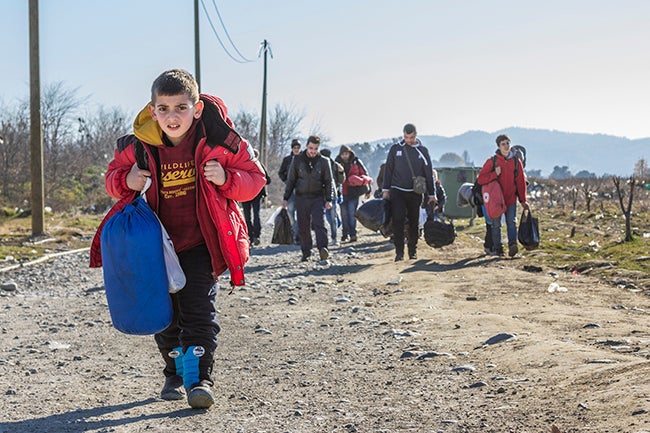On a crisp fall morning in 2000, I drove out to Long Island to take the test that was my final vetting before I could become an American citizen. Hundreds of us – the huddled masses – sat in lines of chairs and waited for our numbers to be called. The test is not a multiple-choice document with bubbles that you shade in with a No. 2 pencil, like you might expect. Instead, you sit across from a government bureaucrat who arbitrarily asks you questions from the 50 or so that you’re supposed to study. One of mine was, “Who is the Governor of New York?” (At the time, it was George Pataki.)
The process is a mundane twin to the grandiose naturalization ceremony. There, hundreds of us also huddle, and together recite the oath of naturalization. Among other things, we agree to “support and defend the Constitution and laws of the United States of America against all enemies, foreign and domestic.”
At this point, our extreme vetting is complete, or so we think, until we’re “randomly selected” for screening at the airport or a bystander yells “go back to your country” while we’re innocently picking through apple bins at the farmer’s market.
The government bureaucrat testing me in 2000 did not know that even before I officially became a citizen, I was an American. I cared about my adopted country, the city I lived in, and the community I belonged to. As soon as I could, I voted. Before that, I started a community-based organization, I lobbied members of Congress, and I served on nonprofit and community boards. Over time, it became clear that being at the table wasn’t enough. We had to form our own tables, ones that were not just diverse but also inclusive, where immigrants were not just guests but also hosts.
In 2010, I created the New American Leaders Project to recruit, train, and support leaders from immigrant communities to run for local and state office. We ran campaigns that embraced immigrant voters and donors. We would govern in ways that ensured all Americans were reflected in policies. We would be the leaders we had been waiting for. In doing this work, I have come to see even more clearly what is missing in our country – a strong vision for a multiracial democracy.
It’s tempting to be seduced by the tagline “nation of immigrants.” In doing so, we deny the past, the history of this land we have made our own, and the stories of the peoples who came before us. Among them are the first peoples of America, the Chicano farm workers, the generations forced into slavery and the Chinese and other immigrants who built the Trans-Pacific Railroad.
At every turn, America drew diverse peoples into its landscape, deciding based on its own economic and social needs who could come and who could stay. Even immigrants who arrived as early in our history as Alexander Hamilton were categorized as good immigrants and bad immigrants. The popular musical captures not just a current political and cultural moment, but also the longstanding political and cultural journey that is America. Its language is powerful and reminds us that who speaks and how we speak matters. That’s why being an “English only”country can be our downfall; speaking and understanding other languages gives us a tool to relate to someone else, something else, to think and love in other ways.
Our great democratic experiment is just that – an experiment. We try, we fail, and we try again. It’s through this effort and constant evaluation that the experiment continues. Women and African Americans have the right to vote, which was granted in the 15th and 19th Amendments. But what are good laws in the face of bad practices? We agree in the separation of church and state. Yet too often religion is at the heart of political debates. We are told to love thy neighbor, but when that neighbor is not like us, we turn on them.
In a more perfect union, we would embrace the full version of our history that I outline above, rather than a narrow view that serves only our own interests. In this America, we would pitch a big tent, with room for all stories, all people, all realities, instead of a small one that closes us off and houses only our own. In this America, we would believe that our democracy draws strength from evolving and expanding, rather than contracting and constricting. This is the America I came to, stayed for, and work toward.
Ten Things Every American Should Know
- The First Peoples of America
- Farm workers’ movement
- Trans-Pacific railroad history
- Life on the plantations
- The push-pull factors in immigration
- The Bill of Rights & the 15th & 19th Amendments
- Separation of church and state
- Hamilton: An American Musical
- A language other than English
- Love thy neighbor
In 1987, E.D. Hirsch sparked a national debate with his book Cultural Literacy, claiming that there is a foundation of common knowledge that every American should know. Today, amidst giant demographic and social shifts, the United States needs such common knowledge more than ever. But a 21st-century sense of cultural literacy has to be radically more diverse and inclusive, and it needs to come not from one person but from all of us. That’s why the Aspen Citizenship and American Identity Program is asking: Today, what should every American know?
In this blog series, Institute partners and leaders from around the United States share their top ten list of things every American should know, exploring how in an age of increasing diversity and widening inequality, this country can cultivate a sense of shared destiny and common civic purpose. Sayu Bhojwani is the founder and president of the New American Leaders Project, leading a movement for inclusive democracy by preparing first and second generation Americans to use their power and potential in elected office.


